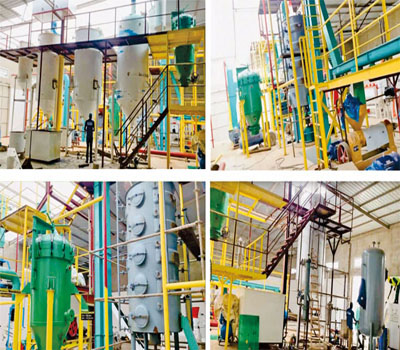Difficulties in edible oil refining process
Edible oil refining process is the process of removing impurities from raw oil to make it meet the edible standard. This process is not only related to the quality and safety of oil products, but also affects the production efficiency and cost control. However, due to the complexity of raw materials and high technical requirements, there are many difficulties in edible oil refining process, which need to be optimized and broken through in many aspects.

First of all, the diversity of raw oil is a major challenge. Different kinds of vegetable oils, such as soybean oil, rapeseed oil, peanut oil, etc., have great differences in raw material composition and impurity types. For example, soybean oil has a high phospholipid content, while palm oil contains more free fatty acids, which requires that the refining process can design special treatment flows for different oils to achieve the best results.
Secondly, the technical requirements of refining steps such as decoloration, deodorization and deacidification are higher. It is necessary to select suitable adsorbents and control the temperature and time in the decoloration process to avoid negative impact on the quality of oil. Deodorization needs to be carried out under high temperature and vacuum conditions. How to avoid oil oxidation while ensuring odor removal is a technical difficulty. In addition, deacidification involves chemical neutralization reaction, and the reaction conditions need to be accurately controlled to reduce the generation of by-products.
Thirdly, environmental protection and cost control are also important issues in refining process. In the refining process, a certain amount of wastewater and waste residue will be produced, and these by-products will pollute the environment if they are not handled properly. Therefore, how to develop efficient and low-pollution treatment technology is the focus of current industry. At the same time, the refining process involves a variety of equipment and consumables. How to reduce energy consumption and resource use under the premise of ensuring quality is also an important challenge for enterprises.
Finally, consumers’ requirements for the quality of edible oil are increasing day by day, which puts forward higher standards for refining technology. For example, how to remove impurities while retaining nutrients in oil, such as vitamin E and phytosterol, is a problem that needs long-term research. In addition, food safety supervision is becoming more and more strict, and the control of heavy metal residues, solvent residues and other indicators has also become a difficult point in the refining process.
In a word, edible oil refining technology is a complex and key technology, and its difficulties involve many aspects such as raw material treatment, technical optimization, environmental protection requirements and consumer demand. In the future, with the development of science and technology and the accumulation of industry experience, these difficulties are expected to be gradually solved to provide consumers with safer and healthier edible oil products.
